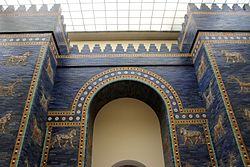This is a list of wars involving the Republic of Iraq and its predecessor states.
Contents
| Conflict | Combatant 1 | Combatant 2 | Results | Iraqi losses | Head of State | Prime Minister | |
|---|---|---|---|---|---|---|---|
| Military | Civilians | ||||||
| Mesopotamian Campaign (1914–1918 World War IWWI) | Allied victory | ~89,500 | ~35,500 | ||||
| Mahmud Barzanji Revolts (1919–1924) | | Kurdish state
| British-Assyrian victory [2] [3]
| ? | ? | Before 1920: After 1920: King Faisal I | Before 1920: After 1920: Abd Al-Rahman Al-Gillani |
| Iraqi War of Independence (1920) | Iraqi rebels
| | British victory | 6,000–10,000 | 2,050–4,000 | None | |
| Ikhwan revolt (1927-1930) |
| Allied victory | 2,000 killed in total | Faisal I of Iraq | Faisal bin Sultan | ||
| Yazidi Revolt (1935) | | Yazidi tribes | Revolts suppressed
| ? | ? | Ghazi of Iraq | Ali Jawdat al-Ayyubi |
| Iraqi Shia Revolts (1935–1936) | | Iraqi Shia tribesmen Ikha Party | Revolts suppressed | ~500 | |||
| Iraqi Coup D'état (1941) | Golden Square victory
| ? | Faisal II of Iraq | Taha al-Hashimi | |||
| Anglo-Iraqi War (1941 WWII) | Military support: |
| Allied victory
| ~500 | ? | Sherif Sharaf | Rashid Ali al-Gaylani |
| Barzani Revolt (1943–1945) | | Barzani tribesmen Allied Kurdish tribes | Iraqi victory
| ? | Faisal II of Iraq | Nuri al-Said | |
| Al-Wathbah Uprising (1948) | | Student Cooperation Committee (communists) Progressive Democrats Populists | Victory
| 300–400 | Mohammad Hassan al-Sadr | ||
| First Arab–Israeli War (1948–1949) | Defeat
| ? | None | Muzahim al-Pachachi | |||
| 14 July Revolution (1958) | Supported by: |
| Free Officers Victory
| ~100 | Nuri al-Said | ||
| Mosul Uprising (1959) | |
| Attempted coup fails
| 2,426 | Muhammad Najib ar-Ruba'i | Abd al-Karim Qasim | |
| First Iraqi–Kurdish War (1961–1970) | Before 1968: Supported by: After 1968: | Yazidis [26] Assyrians Supported by: | Military stalemate [28]
| ~10,000 | ? | ||
| Ramadan Revolution (1963) |
| Iraqi Ba'athist victory
| 100 | ||||
| Ar-Rashid Revolt (1963) | | Coup attempt defeated
| 1+ | Abdul Salam Arif | Ahmed Hassan al-Bakr | ||
| November coup d'état (1963) | | Nasserist victory
| 250 | ||||
| Six-Day War (1967) | Minor involvement: | Defeat
| 10 | None | Abdul Rahman Arif | Abdul Rahman Arif | |
| 17 July Revolution | | Supported by: | Ba’ath victory
| Ahmed Hassan al-Bakr | Ahmed Hassan al-Bakr | ||
| Yom Kippur War (1973) | Defeat [45]
| 278 | None | Ahmed Hassan al-Bakr | Ahmed Hassan al-Bakr | ||
| Second Iraqi–Kurdish War (1974–1975) | Supported by: | Yazidis [48] Supported by: | Iraqi victory [51]
| 7,000 | ? | ||
| Arvand Conflict (1974–1975) | Iranian victory [52]
| Saddam Hussein | Saddam Hussein | ||||
| Iran–Iraq War (1980–1988) |
|
| Inconclusive [f] | 105,000 375,000 | ~100,000 | ||
| Invasion of Kuwait (1990) | Iraqi victory
| 295+ | None | ||||
| Gulf War (1990–1991) |
| Coalition victory
| 20,000–35,000 | 3,664 | |||
| 1991 Iraqi uprisings (1991) | Support: | Shia and leftist elements of opposition:
| Iraqi government military victory (Southern Front)
| ~5,000 | 80,000–230,000 | ||
| Kurdish rebels: Diplomatic Support: | Government Military Victory (Northern Front)
| ||||||
| Iraqi Kurdish Civil War (1995–1996) | Supported by: | KCP Iraqi National Congress Supported by: | Washington Agreement
| ? | |||
| Bombing of Iraq (1998) | Coalition military success [82] Politically inconclusive [82]
| 1,400 [83] (KIA or WIA) | ? | ||||
| Second Sadr Uprising (1999) | Iraqi government victory
| 40+ | 200+ [86] | ||||
| Iraq War (2003–2011) | Invasion (2003) | Invasion (2003) Coalition of the willing | Defeat (Phase 1)
| 7,600–10,800 | 151,000–1,033,000+ | ||
| After invasion (2003–11) | After invasion (2003–11) | Government victory (Phase 2)
| 17,690 | Jalal Talabani | Nouri al-Maliki | ||
| War in Iraq (2013–17) | Allied groups:
Others: |
| Iraqi and allied victory [103] | 25,000+ | 67,000+ | Fuad Masum | Haider al-Abadi |
| 2017 Iraqi–Kurdish conflict (2017) | Supported by: | | Iraqi victory
| None | None | ||
| Iraqi Insurgency (2017–present) | Supported by:
Supported by: | Ongoing as a hit-and-run campaign | 2,254+ | None | |||
| Iraqi intervention in the Syrian Civil War (2017–2019) | Victory
| None | None | Barham Salih | Adil Abdul-Mahdi | ||
